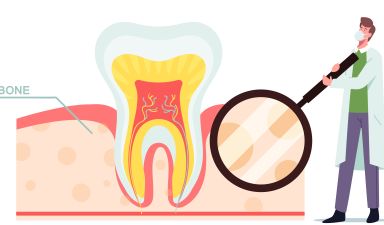Dental Implants
Dental implants are artificial tooth roots that provide a permanent base for fixed or removable replacement teeth. They are an essential part of restorative dentistry and have transformed many people’s lives by returning their ability to speak, eat, and smile confidently.
Dental implants offer several benefits over other tooth replacement options such as bridges or dentures. In this article, we will explore the advantages of dental implants, the types available, the procedure for getting them, misconceptions associated with dental implants and why they are better than any other tooth replacement option.
Advantages of Dental Implants
Dental implants have become an increasingly popular solution for missing or damaged teeth. Not only do they provide a long-lasting replacement option, but they also offer a range of other benefits that make them a far superior choice compared to traditional options such as bridges or dentures. Here are some of the main advantages:
Improved Appearance and Confidence
The most obvious advantage of dental implants is that they can significantly improve the appearance of your smile. Missing teeth can cause embarrassment and discomfort, leading to low self-confidence.
Dental implants seamlessly blend in with your natural teeth, resulting in a more attractive and youthful appearance. Additionally, unlike other options, dental implants prevent bone loss and maintain facial structure by stimulating natural bone growth.
Enhanced Oral Health and Functionality
Dental implants are designed to mimic the function of natural teeth. This means that they restore full biting force and allow you to eat all types of food without any discomfort or restriction. Moreover, dental implants support neighboring teeth and reduce the risk of cavities or gum disease caused by decayed or infected roots.
Longevity and Durability
Dental implants are one of the most durable tooth replacement options available today. Their ability to fuse with the jawbone ensures that they remain securely in place for decades if properly cared for. Unlike traditional tooth replacements such as bridges, which require replacement every five to ten years, dental implants have been known to last a lifetime.
Convenience and Comfort
Dental implant surgery is minimally invasive compared to other dental surgeries such as root canals or extractions. Patients undergoing dental implant procedures report little pain during recovery, leading to minimal disruption in their daily lives post-surgery. Dental implants offer a range of benefits making them the ideal solution for those seeking a long-lasting, functional, and aesthetically pleasing tooth replacement option.
The Dental Implant Procedure
Initial Consultation and Examination
The dental implant procedure begins with a consultation and examination with your dentist. During this appointment, your dentist will evaluate your oral health, take X-rays or CT scans of your mouth, and discuss any concerns or questions you may have about getting dental implants. Your dentist will also review your medical history to ensure that you are a good candidate for the procedure.
Preparatory Procedures such as Bone Grafting or Sinus Lifts
If necessary, preparatory procedures may be required before the actual placement of the dental implant. For example, if you do not have enough bone density in your jaw to support an implant, a bone grafting procedure may be necessary to build up the area.
Similarly, if the sinuses are too close to where the implants will be placed, a sinus lift may be required. These preparatory procedures can help ensure that the implants have sufficient support for proper fusion with the jawbone during healing.
Placement of Dental Implant
Once any preparatory procedures are complete and you are deemed ready for dental implant placement, it is time for surgery. The actual placement of dental implants involves making an incision in the gum tissue to expose the jawbone underneath.
A small hole is then drilled into this bone where an anchor post is inserted into it. After this post has been set into place, a temporary crown or bridge is attached while osseointegration occurs.
Healing Process and Osseointegration
The healing process after implant placement can take several months as osseointegration occurs. During this process, the implant anchors fuse with surrounding bone tissue which provides stability for long-term usage. Ossification happens gradually over time as new bone tissue surrounds each anchor post connecting it securely through out life.
It is important to follow all of your dentist’s instructions for aftercare during this period, including proper oral hygiene practices and any dietary restrictions that may be necessary. Once the process of osseointegration is complete, you will be able to return to your dentist for placement of a permanent crown or bridge on top of the implant posts.
Care and Maintenance of Dental Implants
Proper Oral Hygiene Practices
After the dental implant surgery, it is essential to maintain good oral hygiene to prevent any risk of infection. As with natural teeth, brushing twice a day with a soft-bristled toothbrush and fluoride toothpaste is necessary.
Flossing at least once daily can remove any food particles or plaque that may accumulate around the implants. In addition to daily brushing and flossing, it is recommended to use an antibacterial mouthwash to rinse the mouth thoroughly.
Regular Check-ups with the Dentist
Regular visits to the dentist are imperative for maintaining good oral hygiene after dental implant surgery. The dentist will monitor the implants’ health by inspecting them during routine check-ups, cleaning them professionally, and assessing bone density around them. The hygienist will also clean and polish the implants using ultrasonic scalers or hand instruments if any plaque accumulation occurs around them.
During these follow-up appointments, X-rays may be taken periodically to ensure that there are no issues developing under the surface of the gums that cannot be seen by visual inspection alone. Your dentist may also recommend specific oral hygiene techniques or products tailored specifically for your implant’s needs.
It is essential to keep up with regular appointments as some complications relating to dental implants can arise without symptoms such as peri-implantitis (inflammation or infection of gum tissue around an implant), which can result in bone loss if left untreated. Proper oral hygiene practices such as regular brushing and flossing alongside antibacterial mouthwash use are crucial for maintaining excellent dental implant health while regular check-ups with your dentist can help identify potential problems before they become severe issues.
Common Misconceptions about Dental Implants
There are several misconceptions about dental implants that cause some people to shy away from this excellent tooth replacement option. Here we will tackle three of the most common:
Costly Treatment Option
Dental implants have a reputation for being expensive, and in many cases, they can be more costly than other options such as bridges or dentures. However, it’s important to consider the long-term benefits of dental implants.
Unlike bridges or dentures that may need to be replaced after a few years, dental implants can last a lifetime when properly cared for. In addition, dental implants can improve oral health and prevent further damage and expenses down the line.
Painful Procedure
The idea of having screws drilled into your jawbone may sound painful and intimidating. However, with modern technology and sedation options, getting dental implants is generally not painful at all.
Patients report feeling only mild discomfort during the procedure and manageable soreness afterward that can be relieved with over-the-counter pain medication. Your dentist will work with you to ensure your comfort throughout the entire process.
High Risk of Failure
Some people believe that dental implant surgery has a high risk of failure or complications. While there is always some degree of risk involved in any surgical procedure, including dental implant placement, success rates are very high – between 95-98%.
Proper care and maintenance contribute significantly to the success rate as well as choosing an experienced professional who uses quality materials.
Why Dental Implants are Better Than Other Options
Comparison with other tooth replacement options such as bridges or dentures.
When comparing dental implants to other tooth replacement options like bridges or dentures, there are undeniable advantages that make the former a better option. One of the biggest drawbacks of traditional methods like bridges is that they require grinding down healthy teeth and placing crowns on them, which can weaken them in the long term. Moreover, it can be difficult to clean underneath bridges, which can lead to decay and gum disease.
Dentures, on the other hand, have a notorious reputation for being uncomfortable and slipping out of place. They also tend to cause bone loss in the jaw over time, which can change your facial structure.
Recapitulation of the advantages, types, procedure, care, maintenance, misconceptions.
Dental implants are a superior tooth replacement option due to their numerous benefits like improved appearance and confidence, enhanced oral health and functionality (including speech), longevity and durability (they can last for decades), convenience and comfort (since they feel just like real teeth). There are also different types of dental implants available including endosteal implants (which are placed in the jawbone), subperiosteal implants (which sit under the gum but above the jawbone) and zygomatic implants (which anchor onto cheekbones when there isn’t enough bone in the upper jaw).
The implant procedure involves an initial consultation/examination followed by preparatory procedures if necessary like bone grafting or sinus lifts. Then comes implant placement itself followed by a healing process known as osseointegration.
Maintenance involves proper oral hygiene practices along with regular check-ups with your dentist to ensure everything is functioning properly. common misconceptions including high costs (which may not be as much compared to other treatments in long-run), painful procedure (which can be easily managed with anesthesia) and high risk of failure (which is rare when the right precautions are taken).
Do you live in Bingham Farms or the surrounding area? Our team is ready to help you achieve your smile goals. Schedule your appointment today.



